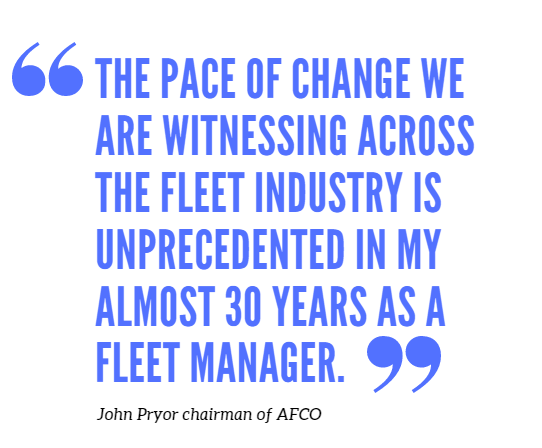ICFM’s Paul Hollick thinks 2018 will be a year of "big bangs aplenty" but what do other industry experts think the forthcoming year has in store for the fleet sector?
He adds: “In recent years, fleets have broadly continued to ‘do what they have always done’ because there has been no ‘big bang’, but that changes in 2018.
“There is no single challenge, but a plethora of major issues that must be tackled by fleet decision-makers to ensure company car and commercial vehicle operations remain cost-effective and operationally efficient.
“I believe 2018 will be a watershed year in the history of fleet.”
His view is supported by John Pryor, chairman of fleet operators’ association ACFO, who adds: “The pace of change we are witnessing across the fleet industry is unprecedented in my almost 30 years as a fleet manager and the number of challenges confronting me and my peers in 2018 continues to escalate.”
Both Hollick and Pryor identified the Government’s ongoing consultation on the taxation of benefits-in-kind (BIK) and employee expenses that includes an examination of approved mileage allowance payments (AMAPs) made to employees that drive their own cars on business journeys as a challenge facing fleets in 2018.
Hollick also says the recent Budget announcements mean fleets must:
- Review whether diesel remains a fleet favourite or petrol, hybrid and plug-in options have a home with a more ‘balanced’ approach to powertrain choice likely.
- Tackle the impact on company car choice lists and vehicle-related taxation of the Worldwide harmonised Light vehicle Test Procedure (WLTP) as more information becomes available.
“The Government’s ill-informed ‘all diesels are dirty’ obsession – today’s Euro 6 emissions cars produce more power and torque with lower CO2 rates when compared with traditional petrol-based engines – will filter down through to local authorities,” says Hollick.
“This could mean an avalanche of local diesel surcharge parking schemes to boost council coffers as well as clean air zones (CAZs) and getting to grips with the April 2019 introduction of London’s Ultra-low Emission Zone (ULEZ).”

Geoffrey Bray, chairman of the Fleet Industry Advisory Group (FIAG) adds: “How fleets adapt to the Government’s and local authorities’ approach to managing vehicle pollution is a challenge and that brings in the viability of all fuel options.
“As FIAG always says, businesses must match vehicle wholelife costs to operating viability and fitness for purpose.
“Equally, while the Government is pushing the case for plug-in vehicles, the size and reliability of the recharging network is far from meeting fleet requirements and recharging speed is also an issue.
“Nevertheless, in some niche fleet operating requirements, plug-in vehicles undoubtedly have a place.”
Other issues include fleet mobility, fuel prices, the lease accounting standards that are effective from 2019 and the May introduction of the General Data Protection Regulation (GDPR) which “promises to be another minefield for employers and fleets”, says Hollick.
Pryor adds: “I cannot recall such a multitude of issues. As a result, perhaps the biggest trend over the next 12 months will be if employers and employees stay loyal to the popularity of the company car or decide that it is getting all too complex and the tax burden too great, and switch to offering cash allowances, which triggers a multitude of other challenges.”
In this feature, industry experts offer their predictions for the year ahead in a number of key areas.
Taxes

Rachel Lane, fleet consultant at Zenith
There are a number of tax changes that will impact fleets over the next year, all of which have the same Government goals of reducing CO2 emissions and moving fleets into cleaner powertrains.
April 2018 sees the change to capital allowances where the CO2 threshold for being able to claim at the main rate of 18% reduces to 110g/km, leading to a typical cost increase of approximately £6 per month.
Fleet managers could consider introducing 110g/km CO2 thresholds in order to avoid any cost increases and plan a review of choice lists when their leasing company puts the changes into quotes, possibly January.
The Autumn Budget 2017 saw the announcement of changes to first-year vehicle excise duty (VED) for diesel cars whereby the rates applied will rise by one band.
READ MORE: Budget: Zenith happy with ‘clear direction of travel’
The cost increase for typical diesel cars will be minimal, for example, an Audi A3 in CO2 band 101-110 will incur an increase of 42p per month over a typical four-year term.
In addition to this, the Chancellor also announced that the diesel supplement will increase by one percentage point from April 2018 for company car tax.
Manufacturers are being incentivised to continue to advance the development of cleaner diesel engines with the confirmation that the diesel supplement will be removed entirely for vehicles that meet the Real Driving Emissions step 2 standard (RDE2), bringing these vehicles in-line with their petrol equivalents.
Currently, no cars meet this standard and this is likely to be the case until around 2020.
These changes to the taxation of diesel vehicles will further support the trend towards increasing numbers of petrol and alternatively-fuelled vehicles being included in company car policies in 2018.
Fleet operators will need to increasingly consider the profile of their driver population when planning what fuel type most suits the needs of their drivers, balancing this with what is most financially beneficial.
There is clearly a lot of work to be done in this area in terms of modelling the most efficient mix of fleet for any business and I would advise fleets of all sizes to consult experts on the subject.
Mobility

Adrian Bewley, head of business mobility UK & Ireland at Enterprise Rent-A-Car
Flexible, cost-effective access to mobility will be the number one corporate requirement in 2018.
Providers are going to have to prove they have the range of vehicles, breadth and depth of offerings, analytics and detailed reporting to provide the perfect fit to a company’s needs.
We’re going to see more senior decision-makers getting involved in mobility decisions, as this will continue to be vital to business success.
They’ll want to see proof that employee needs are being met with the best mobility option available at the time.
READ MORE: "70% of the world population could live in urban areas by 2030", says Enterprise
Fleets will require on-demand access points and solutions for every type of trip and increment of time, from an electric vehicle for an hour,to a car for a month, to a specialist van or truck for five years or more.
Car clubs are also fast becoming a primary option for business travellers who need access and flexibility.
This will grow to complement other forms of travel and allow organisations to easily move away from the unmanaged grey fleet.
Both private and public sectors will get more savvy about grey fleet thanks to better tools for identifying which journeys can be better met with a car club or a rental.
Interest in multi-modal travel strategies will grow to embrace all travel types under one umbrella, while tablet and app-based systems will provide greater flexibility, transparency and choice.
In fact, technology will enable mobility providers to work more closely with employers and drivers to provide better service.
Calibre of service will clearly be an increasing differentiator over the coming months.
Alternative fuels

Stuart Thomas, director of fleet and SME services at the AA
Alternative fuels will be a priority for fleets in 2018 as the Government continues its focus on reducing emissions in UK cities.
From the introduction of clean air zones (CAZs) and increased taxes for diesel cars, there is a much greater focus on the environmental impact of vehicles, and businesses need to take action to future-proof their fleets.
Our recent report, produced in collaboration with BT Fleet Solutions, showed that 95% of fleets are currently made up of diesel or petrol-fuelled vehicles yet, in five years’ time, 63% of them expect to be using alternative fuels.
With many businesses still cautious about how to incorporate electric and other alternatively fuelled vehicles into their fleet, it is important that they work with strategic partners to help them make informed choices about how to reduce their emissions.
At the recent Fleet200 roundtable, driver education and creating a safety culture were at the top of the list for the biggest challenges for fleets next year.
READ MORE: Driver education and creating a safety culture top list of biggest challenges for fleets in 2018 - Fleet200 roundtable debate
We think that connected car technology has a bigger role to play in this area.
For example, our Operational Fleet Insight report revealed that 74% of fleets containing 100-plus vehicles are now using telematics, yet only 33% of them primarily use it to reduce accident rates.
Therefore, fleets could be making much better use of the insight gained by technology to help them educate drivers and improve road safety.
As the use of connected car technology continues to evolve, more fleets will use it to help with ongoing management, e.g. alerting them when a vehicle requires servicing or upgrades.
Brexit

Geoffrey Bray, chairman of Fleet Industry Advisory Group
Fleet decision-makers are fearful of the outcome of Brexit. But what a world will look like with the UK outside the European Union and, specifically, the impact on vehicle pricing and in-life vehicle costs, is unknown.
However, I am optimistic and, while I cannot predict the future, Brexit is already weighing on the decision-making process within some fleets.
Nevertheless, fleet decision-makers must acknowledge the fact that the UK is not an isolated market as far as the automotive industry is concerned.
The UK is a small market in a global economy and when the automotive industry is making marketing, including pricing, decisions they are made invariably in a worldwide context.
The internet has changed the world and, while there are pluses and minuses, generally international businesses are thriving as can be seen from the level of stock markets in London and globally.
It is a challenging and changing world and Brexit will have an impact, but it will also present major opportunities. Businesses must be nimble and alert – and that includes within the fleet arena – and move forward as opportunities occur.
March 29, 2019 is when the UK is scheduled to withdraw from the European Union.
That date is a long way off and the reality is that Brexit negotiations are likely to be protracted and could continue much longer than the Government’s two-year forecast in terms of having new trade agreements in place.
Therefore, fleets must continue to operate against a background of what is known and manage their assets effectively and efficiently.
That means continuing to evolve because standing still awaiting the outcome of Brexit, which will take many months and even years, simply means costs will escalate.
Vans

Mark Cartwright, head of vans and light commercial vehicles at the Freight Transport Association
It’s hard to predict how poor economic growth and pressure on consumer spending will affect businesses on a day-to-day level.
Registrations of new vans continue to grow, but FTA research suggests the dramatic increase in ownership of recent years is slowing.
There are also indications that van fleet investment for 2018 will be lower than previous years.
It’s not clear yet whether these changes mark the start of more modest, steady growth or a significant realignment in the sector.
READ MORE: When is a van a company car? Confusion reigns after new ruling
Managing fuel costs will continue to pose a challenge. While November’s Budget saw another freeze in fuel duty, petrol and diesel prices are rising.
Uptake of electric vehicles in the UK has been slow in comparison to cars. This is likely to change as towns and cities become increasingly keen to penalise or ban older and more polluting vehicles.
Van users will need to plan their fleets to ensure business impact of these new restrictions is minimised.
Van MOT failure rates are at their lowest since the 2008 recession, but the Government has expressed concern that they remain too high, particularly for class 7 vehicles which display very poor standards of roadworthiness.
Many operators still see the MOT test as a ‘diagnostic tool’ which will pinpoint where repairs need to be made.
It’s vital that the van sector continues its success in improving safety standards or it is possible legislators will act to impose a more stringent compliance framework.
The Van Excellence scheme, managed by FTA, aims to address the challenge of improving operating standards, providing leadership and a demanding benchmark for the van community.
Two things to look out for in 2018
1. General Data Protection Regulation (2018)
GDPR, which takes effect on May 25, 2018, will shake up the way personal data is collected, stored and used.
It builds on existing data protection legislation with a particular focus on digitalisation and technology.
Breach GDPR rules and the maximum penalty is a €20 million (£17.9m) fine or 4% of total global turnover for the previous year, whichever is highest.
“GDPR will fundamentally change the way we interact with our employees,” says Caroline Sandall, deputy chairman of ACFO and director of ESE Consulting.
“I think GDPR has perhaps been a little underplayed in terms of its impact on fleet.
“A lot of news items have focused on telematics data and the more obvious data things, when actually what is really critical is making sure you can absolutely prove that drivers understand what is happening to their data and that you maintain a robust audit trail to show this.
“The magnitude of this is not to be underestimated.”
2. Residual values
Residual values in 2018 will be impacted by a number of known factors as well as some “known unknowns”, says Martin Potter, group operations director at Aston Barclay.
These include:
- Brexit arrangements
- The effect of ULEZ and T-Charges on used diesel desirability
- Any potential diesel scrappage scheme
- A continued fall in new car registrations
- The November 2017 interest rate rise and expected further increases in 2018.
Potter expects January to start strongly with buyers looking to replenish stock after Christmas trading and expects it to remain buoyant until the traditional Easter registration plate change.





















Login to comment
Comments
No comments have been made yet.